Due to the new coronavirus infection (COVID-19), personal hygiene care and prolonged “stay at home” have also caused a seismic change in the detergent market. According to related industries, South Korea’s laundry detergent market was 522 billion won in 2020, 32 billion won larger than in 2019 (490 billion won). An industry official said, “As the time spent at home is getting longer due to COVID-19, people tend to do laundry more often than collecting laundry.” and “The use of detergent has increased and the market size has also grown a lot.”
The two biggest trends of laundry detergent and fabric softener are 1. Functionality and convenience and 2. Eco-friendly.
1. Functionality and convenience
1) Liquid detergents
Liquid detergents accounted for 350 billion won (67%) of the laundry detergent market in 2020, a significant increase from 300 billion won (31 percent) in 2019. This is because the demand for liquid detergents, which are less likely to remain, has increased because they dissolve enough even if they use less water.
2) Fabric softeners
The key function of fabric softener is to prevent static electricity and soften the fabric. However, if it’s all, consumers will not have a choice. It started adding fragrance to the fabric as an auxiliary function, but sooner or later, the main guest turned and became recognized as “fabric softeners = fragrances.” It is as fierce as the perfume market.
P&G’s ‘Downy Botanis’ series is famous as a representative product, and recently launched ‘Spring Garden’, which allows home users to feel the gentle scent of the streets in springtime at home. There is also Aekyung’s ‘Le Chatelard 1802’, which contains the scent of various flowers. Since its first release in 2019, sales have grown 193% year-on-year in the first three quarters of last year.
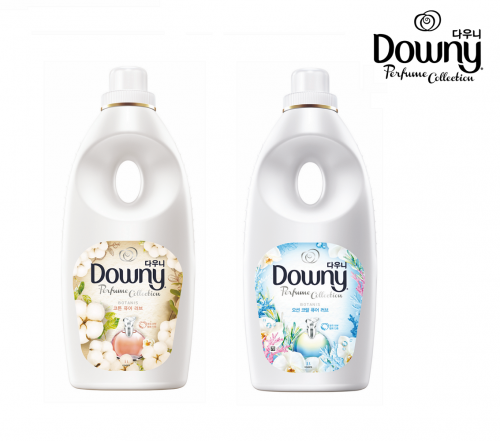
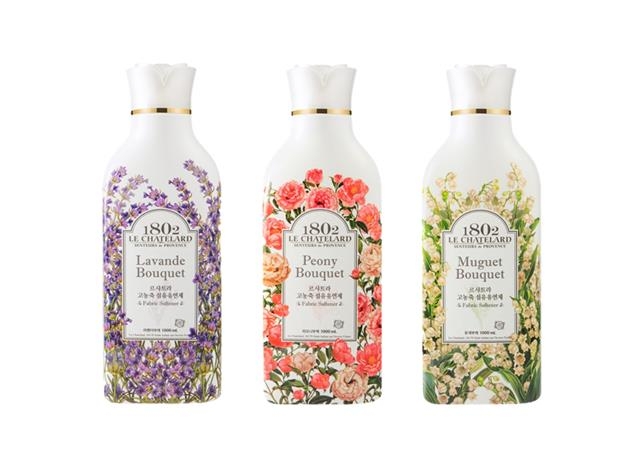
3) For indoor drying
The demand for so-called ‘indoor drying detergents and fabric softeners’ and high-performance products with antibacterial and virus removal functions is increasing significantly. Analysts say that the demand for personal hygiene such as cleaning and laundry has naturally increased as time spent at home increased due to refraining from outside activities and working from home. In addition, as more and more people dry their laundry indoors rather than outdoors due to fine dust, etc., demand to solve the disadvantage of drying indoors and smell musty is also the reason why detergents and fabric softeners for indoor drying have recently emerged.
LG Household & Health Care’s ‘Fiji Viru-X’, introduced in October 2020 targeting COVID-19, is very popular. Through an external testing agency, it has confirmed the effect of removing not only stains but also 99.9% of COVID-19, feline coronavirus, and influenza A viruses, as well as 9 harmful bacteria such as E. coli and Yellow Staphylococcus aureus that cause various diseases. P&G recently introduced the ‘Downy Indoor Dry Laundry Detergent.’ Released in two types: liquid and puff, and it prevents odors generated during indoor drying by removing invisible stains such as sweat and sebum. Pigeon also recently renewed 4 types of ‘Highly Concentrated Pigeon Signature Indoor Drying’. It has improved indoor drying function by using ‘cyclodextrin’ extracted from cornstarch.
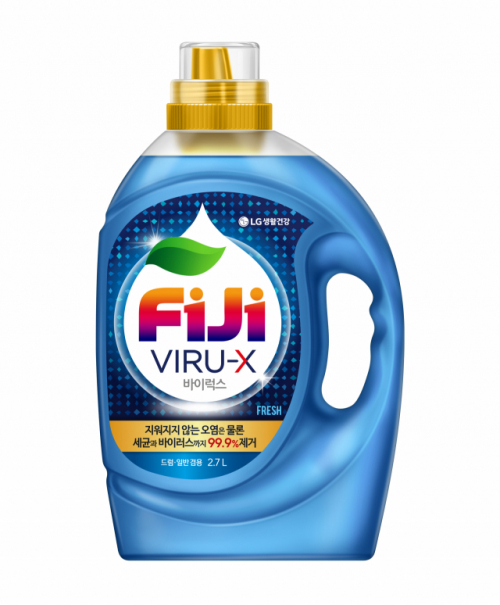
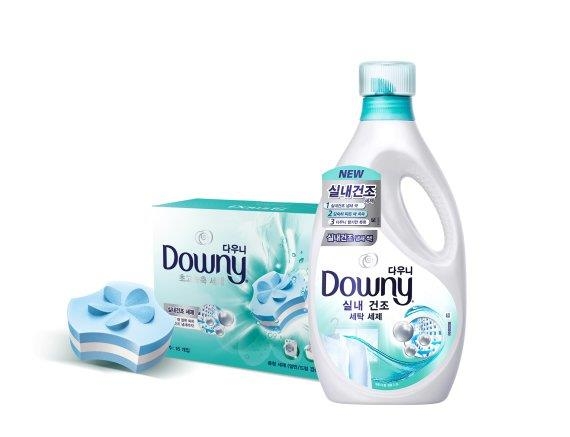
2. Eco-friendly
The MZ generation, emerging as a new consumer force, is more interested in environmental issues than any other generation. “Meaning Out” consumption, which pursues more meaningful and valuable consumption, is increasing centering on them. Laundry detergent and fabric softener companies are also quickly following this trend.
1) Natural ingredients
The “Highly concentrated Pidgeon Signature Indoor Drying” product, which was mentioned earlier, is said to have added natural ingredients extracted from corn starch without using microplastics, colorants, and preservatives in line with the clean beauty trend spreading to the detergent market.
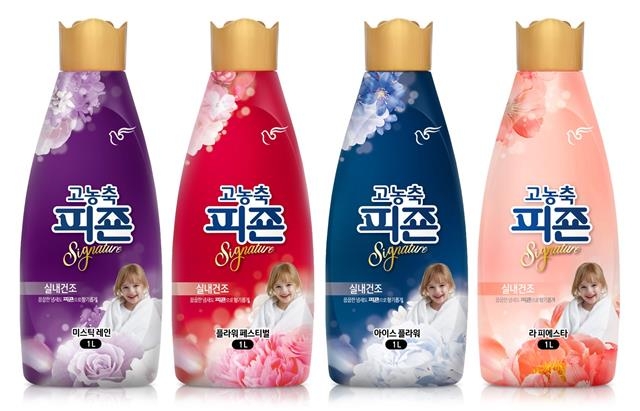
2) Resource saving
The puff-type ‘Downy Laundry Detergent Foam Type’ is a ‘3-in-1’ laundry detergent in a three-layer sandwich-type design with three effects: deep cleaning, deodorizing, and refreshing. P&G reduced the moisture content in products by 90% compared to liquid detergents, and broke the stereotype that detergents should always be in plastic containers and produced with a 70% reduction in plastic usage. Thanks to its simple puff design, you can put one foam per wash in the washing machine without need to measure it. By reducing rinsing steps, up to 60 liters of water can be saved per wash.
3) Refill stations
In order to reduce plastic waste, E-Mart has been operating the ‘Eco Refill Station’, a vending machine that can refill laundry detergent and fabric softener since September 2020. (※Note: The Eco Refill Station is a pilot project for subdivided refill sales of household chemical products by the Ministry of Environment. E-Mart, a distributor, and Sugar Bubble, a detergent manufacturer, participated together.)
How to use the Eco Refill Station is simple. If you are a first-time customer, you can buy a refill container (500 won) and take the product you select from the machine. The refill prices are 35~39% cheaper than regular products. The Eco Refill Station has expanded its consumer contact points to 6 E-Mart stores and 3 Traders stores, and its number of consumers more than doubled from 1,000 in November 2020 to 2,300 in March 2021.
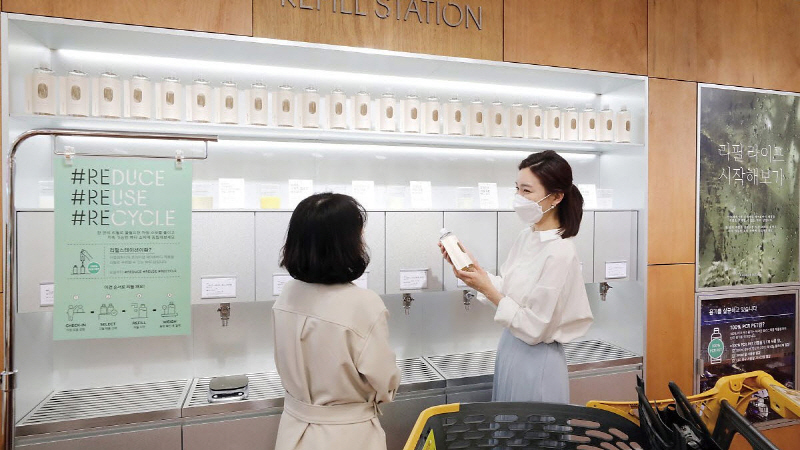
Shinsegae Department Store, The Hyundai Seoul (multi shopping complex), and GS25 (convenience store) are also operating refill stations. It is based on the refill station of ‘ecostore’, New Zealand’s No.1 eco-friendly home and body care brand. After purchasing a refill container made of 100% recycled plastic at the store, and put them in containers as much as needed among the various eco-friendly laundry detergents and fabric softeners in the store, and pays only that much price.
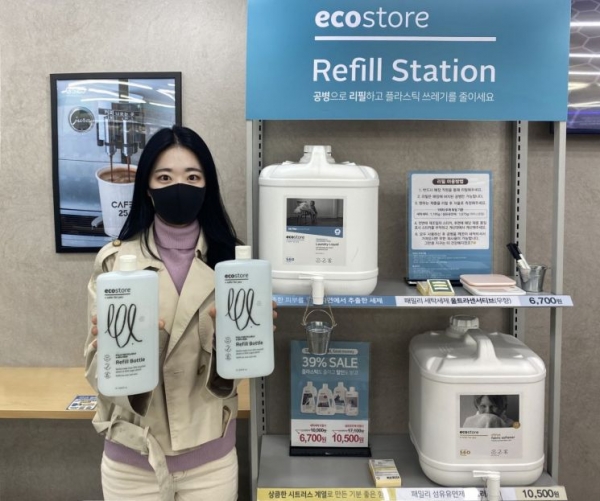
The next article will cover the marketing strategies and activities.
Please stay tuned!